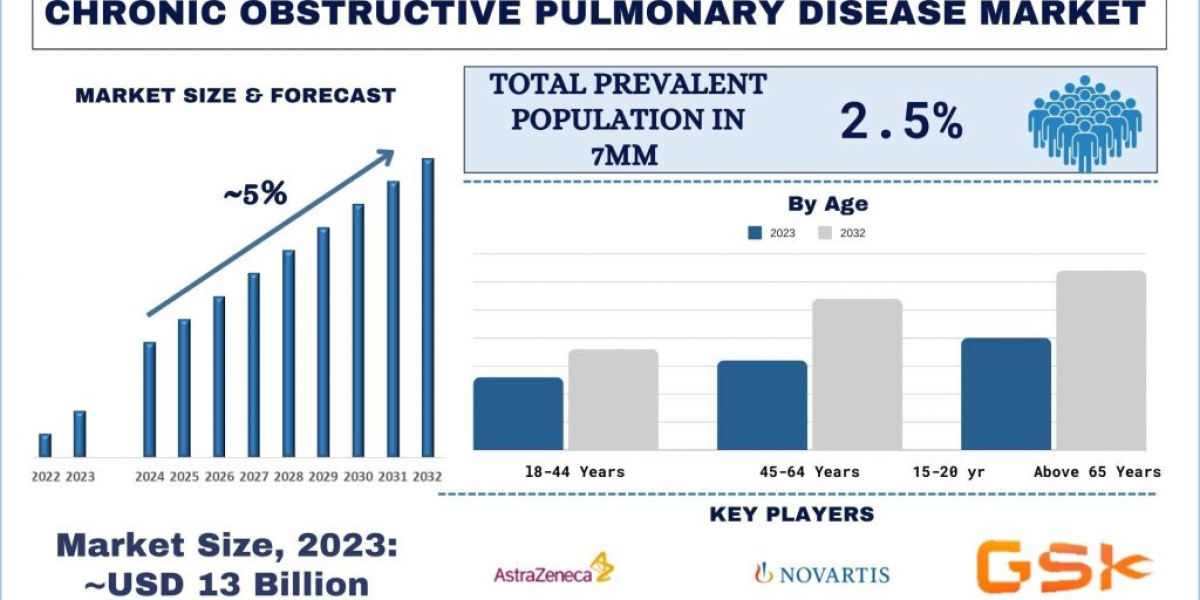According to UnivDatos Market Insights, The Chronic Obstructive Pulmonary Disease Market was valued at approximately USD 13 Billion in 2023 and is expected to grow at a strong CAGR of around ~5% during the forecast period (2024-2032). Chronic Obstructive Pulmonary Disease (COPD) is a group of progressive lung diseases that cause obstructed airflow from the lungs, leading to breathing difficulties. It includes emphysema, chronic bronchitis, and in some cases, asthma. COPD is a significant cause of morbidity and mortality worldwide, impacting the quality of life of millions. The World Health Organization (WHO) reports that COPD is the third leading cause of death globally, with over 3 million deaths annually attributed to the disease.
Request To Download Sample of This Strategic Report - https://univdatos.com/get-a-free-sample-form-php/?product_id=62811
Overview of COPD
COPD is characterized by persistent respiratory symptoms and airflow limitation due to airway and/or alveolar abnormalities, typically caused by significant exposure to noxious particles or gases. The most common symptoms include dyspnoea (shortness of breath), chronic cough, and sputum production. As the disease progresses, these symptoms worsen, leading to decreased physical activity, frequent hospitalizations, and a diminished quality of life.
Diagnosis of COPD
Diagnosing COPD involves a combination of patient history, physical examinations, and diagnostic tests. The primary diagnostic tool is spirometry, which measures the amount and speed of air a person can exhale after a deep breath. A post-bronchodilator Forced Expiratory Volume in one second (FEV1)/Forced Vital Capacity (FVC) ratio of less than 0.70 confirms the presence of persistent airflow limitation and thus COPD.
Additional diagnostic methods may include:
- Chest X-rays: To identify emphysema or other lung problems.
- CT Scans: Providing more detailed images of the lungs.
- Arterial Blood Gas Analysis: Measuring the levels of oxygen and carbon dioxide in the blood to evaluate lung function.
- Alpha-1 Antitrypsin Deficiency Test: Screening for a genetic disorder that can cause COPD.
Treatment Options for COPD
Treatment for COPD aims to relieve symptoms, improve quality of life, and slow disease progression. While there is no cure for COPD, several treatments can help manage the disease effectively:
Medications
- Bronchodilators: These are the cornerstone of COPD treatment. They relax the muscles around the airways, improving airflow. Short-acting bronchodilators (SABAs and SAMAs) are used for immediate relief, while long-acting bronchodilators (LABAs and LAMAs) are used for maintenance therapy.
- Inhaled Corticosteroids (ICS): These reduce inflammation in the airways and are often used in combination with bronchodilators, particularly for patients with frequent exacerbations.
- Phosphodiesterase-4 (PDE4) Inhibitors: Such as roflumilast, these reduce inflammation and relax the airways in severe COPD.
- Mucolytics: These help thin and loosen mucus in the airways, making it easier to cough up.
Non-Pharmacological Treatments
- Oxygen Therapy: For patients with severe hypoxemia, long-term oxygen therapy can improve survival, exercise capacity, and quality of life.
- Pulmonary Rehabilitation: This comprehensive program includes exercise training, nutritional advice, and education, which collectively help improve the overall physical and emotional condition of individuals with COPD.
- Surgical Options: In advanced cases, surgical interventions such as lung volume reduction surgery (LVRS), bullectomy, or lung transplantation may be considered.
Risk Factors for COPD
The primary cause of COPD is long-term exposure to substances that irritate and damage the lungs. Key risk factors include:
- Smoking: The most significant risk factor, accounting for up to 90% of COPD cases in high-income countries. Tobacco smoke irritates the airways and contributes to the development of chronic bronchitis and emphysema.
- Environmental Pollutants: Long-term exposure to air pollution, chemical fumes, and dust can increase the risk of developing COPD.
- Occupational Exposures: Individuals working in environments with significant exposure to dust, chemicals, and fumes are at higher risk.
- Genetic Factors: A rare genetic disorder, alpha-1 antitrypsin deficiency, can cause COPD. This protein protects the lungs, and a deficiency leads to increased vulnerability to lung damage.
- Age and Gender: The likelihood of developing COPD increases with age, and although more common in men, the incidence in women has been rising, partly due to increased smoking rates among women.
Click here to view the Report Description & TOC - https://univdatos.com/report/chronic-obstructive-pulmonary-disease-market/
Emerging Therapies for COPD
Recent advancements in medical research are leading to the development of new therapies aimed at improving the management of COPD. Some promising emerging therapies include:
- Biologics: These targeted therapies address specific pathways involved in COPD pathogenesis. For example, anti-IL-5 and anti-IL-5R therapies (e.g., mepolizumab, benralizumab) target eosinophilic inflammation, which is a significant component in some COPD patients.
- Stem Cell Therapy: Research into mesenchymal stem cells (MSCs) shows potential due to their anti-inflammatory and immunomodulatory properties, which could help repair damaged lung tissue.
- Phosphodiesterase-3 and -4 Inhibitors: Dual PDE3/4 inhibitors, like ensifentrine, are being explored for their ability to provide greater anti-inflammatory effects with fewer side effects.
- Triple Therapy Inhalers: Combining LABA, LAMA, and ICS in a single inhaler has shown to improve lung function, reduce exacerbations, and enhance quality of life.
- Vaccines and Immunotherapies: New vaccines targeting respiratory pathogens are being developed to prevent infections that can exacerbate COPD.
Conclusion
COPD is a chronic and debilitating condition with significant impacts on individuals and healthcare systems worldwide. Early diagnosis and appropriate management are crucial to improving patient outcomes. With advancements in medical research, emerging therapies hold promise for more effective management of COPD, offering hope for better quality of life for millions of patients. It remains essential to address risk factors, particularly smoking, and to enhance patient education and support to manage this chronic condition effectively.
Related Healthcare Market Research Report
Antibiotic Resistance Market: Current Analysis and Forecast (2024-2032)
Software as a Medical Device Market: Current Analysis and Forecast (2024-2032)
Opioid Use Disorder (OUD) Treatment Market: Current Analysis and Forecast (2024-2032)
Elastography Imaging Market: Current Analysis and Forecast (2024-2032)
Sperm Bank Market: Current Analysis and Forecast (2024-2032)
India Catheter Market: Current Analysis and Forecast (2024-2032)
Contact Us:
UnivDatos Market Insights
Email - contact@univdatos.com
Contact Number - +1 9782263411
Website - https://univdatos.com/
Linkedin- https://www.linkedin.com/company/univ-datos-market-insight/mycompany/









